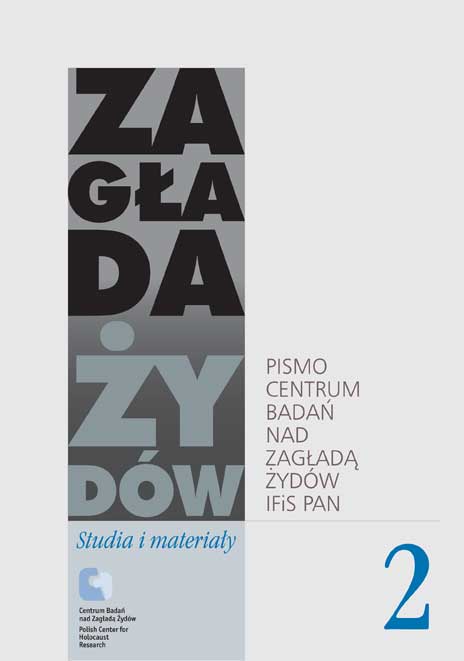Nazistowski mord na Żydach w prasie polskich komunistów (1942–1944).
Zagłada Żydów. Studia i Materiały, Nr 2 (2006), Strony: 54-75
Data zgłoszenia: 2020-10-11Data publikacji: 2006-12-02
 https://doi.org/10.32927/ZZSiM.180
https://doi.org/10.32927/ZZSiM.180
Abstrakt
Facing the decisive struggle between Nazism and Soviet communism for dominance in Europe, in 1942/43 Polish communists sojourning in the USSR espoused anti-German concepts of the political right. Their aim was an ethnic Polish ‘national communism’. Meanwhile, the Polish Workers’ Party in the occupied country advocated a maximum intensification of civilian resistance and partisan struggle. In this context, commentaries on the Nazi judeocide were an important element in their endeavors to influence the prevailing mood in the country: The underground communist press often pointed to the fate of the murdered Jews as a warning in order to make it clear to the Polish population where a deficient lack of resistance could lead. However, an agreed, unconditional Polish and Jewish armed resistance did not come about.
At the same time, the communist press constantly expanded its demagogic confrontation with Polish “reactionaries” and accused them of shared responsibility for the Nazi murder of the Jews, while the Polish government (in London) was attacked for its failure. This antagonism was intensified in the fierce dispute between the Polish and Soviet governments after the rift which followed revelations about the Katyn massacre. Now the communist propaganda image of the enemy came to the fore in respect to the government and its representatives in occupied Poland. It viewed the government-in-exile as being allied with the “reactionaries,” indifferent to the murder of the Jews, and thus acting ultimately on behalf of Nazi German policy. The communists denounced the real and supposed antisemitism of their adversaries more and more bluntly. In view of their political isolation, they coupled them together, in an undifferentiated manner, extending from the right-wing radical ONR to the social democrats and the other parties represented in the underground parliament loyal to the London based Polish government. Thereby communist propaganda tried to discredit their opponents and to justify the need for a new start in a post-war Poland whose fate should be shaped by the revolutionary left. They were thus paving the way for the ultimate communist takeover
Słowa kluczowe
Zagłada , Sowieci a Zagłada , prasa komunistyczna , Katyń , antysemityzm
Licencja
Prawa autorskie (c) 2006 Autor&"Zagłada Żydów. Studia i Materiały"

Utwór dostępny jest na licencji Creative Commons Uznanie autorstwa 4.0 Międzynarodowe.
https://creativecommons.org/licenses/by/4.0
Czasopismo publikowane jest w standardzie Diamond Open Access na licencji CC-BY-4.0 Deed - Uznanie autorstwa 4.0 Międzynarodowa - Creative Commons
Inne teksty tego samego autora
- Klaus Peter Friedrich, Isaiah Trunk, Łódź Ghetto: A History; Andrea Löw, Juden im Getto Litzmannstadt. Lebensbedingungen, Selbstwahrnehmung, Verhalten , Zagłada Żydów. Studia i Materiały: Nr 3 (2007)
Podobne artykuły
- Dariusz Libionka, Jan Grabowski, Anatomia donosu ks. Stanisława Trzeciaka na ks. Tadeusza Pudra , Zagłada Żydów. Studia i Materiały: Nr 13 (2017)
- Jacek Leociak, Ginczanka , Zagłada Żydów. Studia i Materiały: Nr 11 (2015)
- Jacek Leociak, Zagłada w „Muzeum życia” (Muzeum Polin i jego kłopoty z muranowskim genius loci) , Zagłada Żydów. Studia i Materiały: Nr 11 (2015)
- Jacek Leociak, Marta Tomczok, Afektywny kicz holokaustowy – wprowadzenie , Zagłada Żydów. Studia i Materiały: Nr 17 (2021)
- Agnieszka Kajczyk, Iwona Kurz, „Obraz typowy”. Album Zagłada Żydostwa Polskiego (1945) , Zagłada Żydów. Studia i Materiały: Nr 20 (2024)
- Alina Skibińska, Jakub Petelewicz, Udział Polaków w zbrodniach na Żydach na prowincji regionu Świętokrzyskiego , Zagłada Żydów. Studia i Materiały: Nr 1 (2005)
- Dariusz Libionka, Adam Kopciowski, Życie i Zagłada w Hrubieszowie w oczach młodej warszawianki , Zagłada Żydów. Studia i Materiały: Nr 3 (2007)
- Dariusz Libionka, The Fighting and the Propaganda: The Uprising in the Warsaw Ghetto from the Perspective of ‘Polish London’ , Zagłada Żydów. Studia i Materiały: Nr Holocaust Studies and Materials (2017)
- Adam Kopciowski, Szama Grajer – „żydowski król” z Lublina , Zagłada Żydów. Studia i Materiały: Nr 16 (2020)
- Jacek Leociak, Literature of the Personal Document as a Source in Holocaust Research (a Methodological Reconnaissance). , Zagłada Żydów. Studia i Materiały: 2008: Holocaust Studies and Materials
<< < 1 2 3 4 5 6 7 8 9 10 11 12 13 14 15 16 17 18 19 20 21 22 23 24 25 26 27 28 29 30 31 32 33 34 35 36 37 38 39 40 41 42 43 44 45 46 47 48 49 > >>
Możesz również Rozpocznij zaawansowane wyszukiwanie podobieństw dla tego artykułu.
 English
English
 Język Polski
Język Polski








